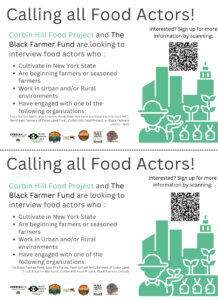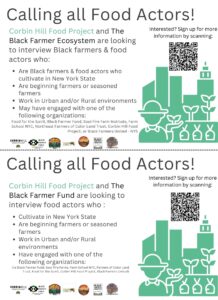Progress report for LNE21-429R
Project Information
To be determined.
Corbin Hill (CH) and Farm School NYC will research the development of the first Black Farmer Commons (BFC) in the Northeast. CH intends to transfer 95-acres in New York to experienced, landless and under-resourced Black farmers as they co-create the BFC. The research explores how supportive facilitation and a sovereignty framework based on historic and current collective land ownership, business and governance models impact black farm tenure and viability. The outcome expected is a novel pilot model of Black ownership, land transfer processes adaptable to farmers without succession plans, and progress toward a racially just, regenerative and equitable food system.
Black farmers have been marginalized nearly out of existence. Nationwide, Black farm ownership declined from 10 million acres in 1930 to 4 million acres in 2012; black-owned farms have an average size of 77 acres, compared to 205 acres for white-owned farmers; and in New York State, only 139 of 57,000 farmers were Black. (USDA Census of Agriculture, 2017).
This research project, “Reclaiming Power and Ownership to Create a Black Farmer Commons in the Northeast” will capture how an ecosystem of organizations led by Black and Indigenous People of Color are individually and collectively working towards creating a Black Farmer Commons. The working mission of the ecosystem of organizations is “to shift power and ownership to Black farmers in New York State by cultivating community, resources, skills, and learning to ensure thriving Black farmers drive policy and advocacy, hold capital and land, and control markets.”
The research project seeks to answer: “Can an ecosystem of organizations led by Black and Indigenous people of color (BIPOC) providing educational, financial, social and operational support creating new ownership and economic pathways for Black farmers’ collective success?”
The intended outcomes for the research project are:
- A comprehensive asset map of resources, including the human, financial, organizational, and community resources available within the ecosystem and its networks,
- A progress report of the ecosystem’s efforts and learnings during the tenure of the ecosystem’s existence (including its impact on Black farmers),
- An exploration of previous examples/models of Black Farmer Commons, and
- Proposed policies that can support the establishing and sustaining of a Black Farmer Commons led by Black farmers in the Northeast
Cooperators
- (Researcher)
- (Researcher)
- (Researcher)
- (Researcher)
- (Researcher)
- (Researcher)
- (Researcher)
Research
Research Description
Corbin Hill Food Project recognizes the necessity of research but rejects standard research methodologies due to its historical manipulation and abuse of Black and brown communities.
Our data collection and evaluation policies and practices center our values: from extraction towards self-determination and sovereignty. We believe data should serve the needs of the community and contribute toward collective goals and future funding opportunities to continue the work. CHFP maintains a strong entrepreneurial approach including collection of real time data that informs and helps to iterate processes along the way. The methods and methodology outlined in this project attempts to uphold said values, and thus are subject to adapt as the project progresses.
Study Population(s) with rationale for selection.
The study populations of this project include an ecosystem of organizations with the collective goal of supporting Black farmers and Black food actors connected to the ecosystem’s collective networks. They will be involved in the development, implementation, and analysis for this project. Project cooperators and facilitators from the ecosystem organizations will facilitate the development, implementation, and analysis of data. This project will leverage the collective knowledge and diverse perspectives of research facilitators that come from a variety of professional backgrounds and roles, including organizational Directors, Coordinators, Managers, and Associates who come from business, agricultural, anthropological, and health backgrounds with extensive experience working in community with Black food actors.
We will recruit three Black farmers involved in the programming offered by each organization. Recruitment will leverage personal and professional relationships to ensure strong relational foundations throughout the project. Black farmers within the ecosystem’s pipeline are taking part in the ecosystem work, serving as the most valuable resource of information to the functionality, benefits, assets, and/or issues within the ecosystem.
Methods: Experimental design, methods and instruments to be used.
Facilitators will use a mixed-methods approach, conducting interviews, organizing focus groups, collecting surveys which will include asset/abundance maps, which will draw from both Black Farmers engaged in ecosystem programming. This project uses a Community Based Participatory framework, which analyzes social, structural, and physical environmental inequities through active involvement of community members, organizational representatives, and researchers in all aspects of the research process (Citation). The advantages of CBPR are that it allows for the innovative adaptation of existing resources, explores local knowledge and perceptions, empowers community members by considering them agents who can investigate their own situations, the community input makes the project credible, enhancing its usefulness by aligning it with what the community perceives as social and health goals, and it helps dismantle the lack of trust communities may exhibit in relation to research (Citation)
Data Collection: Data to be collected and collection protocols.
Qualitative Methodology
Given this project’s mixed-methods approach, facilitators will use both qualitative and quantitative data collection tools: interviews and focus groups. They will conduct 3, 20 minute, 1-1 semi-structured interviews with participating farmers over the course of a 10 month period. Interviews will be conducted with a sample of Black farmers and ecosystem members. Semi-structured interviews will allow for flexibility while maintaining an established interview guide prior to the meeting. Research facilitators will draft all Interview guides and then get feedback and final approval by both ecosystem members and participating farmers. Questions will contain relevant themes that will be determined by the cooperators as a group. Interviews allow for a large amount of data to be collected in a relatively short time frame, and given that facilitators will also be the interview administrators, it aids in creating a non-threatening environment for participants to speak freely.
Facilitators will also conduct four, 90 minute, Semi-structured, facilitated focus groups, two with ecosystem organization’s members and two with recruited Black farmers, over a 10 month period. Focus groups allow for candid discussions within community, where trust and shared experiences are a part of the foundations of a secure environment. Focus group questions will contain relevant themes that will be determined by the cooperators as a group, which can inform the iterative process, and may lead to re-conducting the focus groups with the same participants. Research facilitators will also draft all focus group question guides and then get feedback and final approval by both ecosystem members and participating farmers. Focus group questions may help identify shared community valves, barriers to achieving success not already known by ecosystem members, organizational and governing structures around food justice and land ownership, production planning; non-traditional financial structures and the nature of a regenerative farm. Focus groups and interviews will be audio-recorded and transcribed for qualitative analysis.
Quantitative Methodology
As the interviews and focus groups will provide substantial, anecdotal data to be transcribed and analyzed, facilitators will develop an adjoining cross-sectional survey for the ecosystem members. Surveys are intended to provide a general overview of the ecosystem programs, including their participant demographics, organizational assets and needs, and outcome/impact measures over the tenure of each participating ecosystem organization. Surveys length and number of questions will be determined with the recruited ecosystem participants using a consensus decision making process for transparency and consent. Surveys will contain closed questions and will be analyzed using traditional statistical methods.
Jan 25th Update:
- Please refer to the attached SARE Work Plan_2023_BFE_CHFP. This spreadsheet indicates all intended project objectives, tasks, and responsibilities among collaborators.
To be Determined.
To be Determined.
Education & outreach activities and participation summary
Participation summary:
This flyer was the teams first attempt at establishing a set of criteria for Farmer/Cultivator outreach. While this flyer was intended to be used at a Black Farmer gathering, it is instead being used an example for new outreach material.
After meeting again on, we updated the flyer to begin distribution. The criteria was decided among the research team as to narrow the scope of the project to focus on New York food actors rather than the full Northeast. In addition, we added a range for the experience level of the farmers to span between starting and experienced. This is to ensure having a range of experiences represented in the data pool. This will also encourage cross-sharing when in-person gatherings occur. We included urban and rural farming as NYS has a mixture of cultivators who use land, water, or apartment rooftops. The reasoning behind the final criteria is to collect data on the assets and needs of and around participating farmers, and strengths and areas of need of the Black Farmer Ecosystem.
Learning Outcomes
TBD

